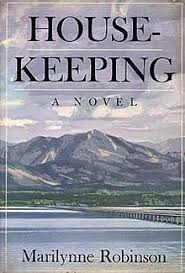Jessi Jezewska Stevens at The Paris Review:
 Housekeeping, now nearing its fortieth anniversary, has returned to me throughout my writing career. Like those enraptured critics, in my first encounters I read for language, for voice, for craft. I loved this book. In graduate school, in a seminar on the literature of travel and trains, my professor recited the opening line to the class with a kind of disgusted glee: “My name is Ruth.” What kind of beginning was this? How had such an otherwise beautifully written book gotten away with it? The declaration—harsh, direct—is perhaps more shocking in the context of the rest of the novel, which proceeds with the gentle indifference of understatement. That opening chapter describes a mass drowning as no more upsetting than an exploratory dive: a train “nosed” into a lake, Ruth tells us, as calmly as a “weasel,” claiming all the passengers within as the water “sealed itself” over their souls. The scene is so soft, so seductive, it may as well have been narrated by a ghost. I remember we spent the remaining hour of that class discussing whether drowning truly was the most romantic way to die. I wonder now if perhaps parting from one’s body becomes more appallingly beautiful when alibied by the suggestion of an afterlife.
Housekeeping, now nearing its fortieth anniversary, has returned to me throughout my writing career. Like those enraptured critics, in my first encounters I read for language, for voice, for craft. I loved this book. In graduate school, in a seminar on the literature of travel and trains, my professor recited the opening line to the class with a kind of disgusted glee: “My name is Ruth.” What kind of beginning was this? How had such an otherwise beautifully written book gotten away with it? The declaration—harsh, direct—is perhaps more shocking in the context of the rest of the novel, which proceeds with the gentle indifference of understatement. That opening chapter describes a mass drowning as no more upsetting than an exploratory dive: a train “nosed” into a lake, Ruth tells us, as calmly as a “weasel,” claiming all the passengers within as the water “sealed itself” over their souls. The scene is so soft, so seductive, it may as well have been narrated by a ghost. I remember we spent the remaining hour of that class discussing whether drowning truly was the most romantic way to die. I wonder now if perhaps parting from one’s body becomes more appallingly beautiful when alibied by the suggestion of an afterlife.
more here.
